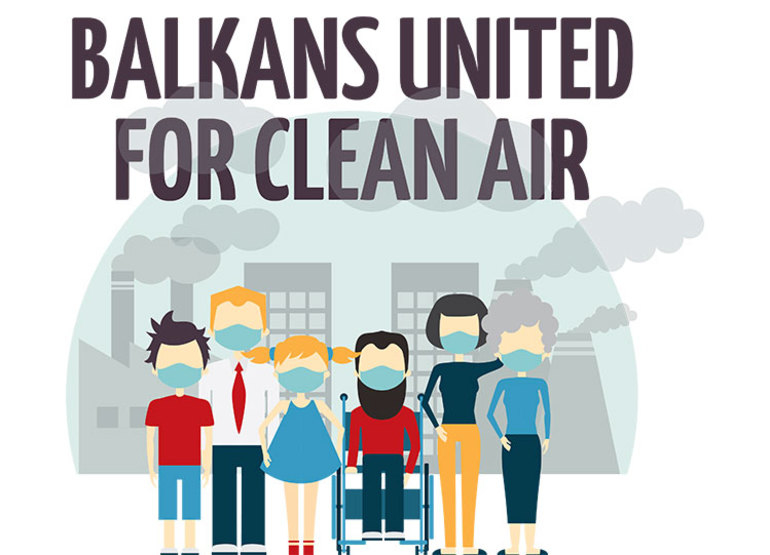
AIR POLLUTION AND ITS CONSEQUENCES ON MORTALITY RATES AND THE HEALTH OF WESTERN BALKANS CITIZENS
Air pollution in the Western Balkans causes 30,000 premature deaths a year, the European Environment Agency estimates. Inhaling polluted air leads to increased mortality, shortened life expectancy and an increase in the number of chronic diseases, while the health costs paid by the citizens of the Western Balkans are rising. Reducing air pollution is a public health measure that would directly increase citizens’ quality of life and health, and indirectly reduce mortality rates.
Poor air quality in the Western Balkans places the region at the top of Europe’s most polluted areas and continues to cause a growing decline of public health. The region’s countries are particularly jeopardized because air pollution combined with a lower level of economic development, poverty and subpar healthcare systems, adds up to create a lethal situation.
Some of the main sources of air pollution in the Western Balkans include the use of coal for energy production, industry emissions, waste combustion, agriculture and construction activities, transport vehicles, and diesel generators. These sources are also the main locations of origin for particulate matter (PM2.5 and PM10), ozone, nitrogen oxides, sulfur dioxide, carbon dioxide and heavy metals, which are globally responsible for millions of premature deaths every year.
The effects of exposure to polluted air vary, from clinical effects such as lower respiratory infections, to premature death and increased mortality rates from stroke, heart disease, chronic pulmonary disease, lung cancer and acute respiratory infections.
The price of polluted air is paid in human lives
According to estimates[1] by the European Environment Agency, air pollution in Western Balkan countries has led to a total of 30,000 premature deaths attributable to excessive particulate matter (PM2.5), ozone (O3) and nitrogen dioxide (NO2) pollution.
The EU’s Joint Research Centre states that air pollution, on average, contributes between 4% and 19% of the total premature mortality rates, and decreases life expectancy by 0.4-1.3 years in countries of the Western Balkans.
It is estimated that exposure to solid particles (PM2.5) is responsible for 75 percent of all deaths related to exposure to polluted air. The values of permitted emissions of pollutants defined in the guidelines on air quality – in Albania, Bosnia and Herzegovina, Montenegro, North Macedonia, Kosovo and Serbia are higher than in most EU member states.
Data from the report "Chronic Coal Pollution" show that more than half of premature deaths in 2016 caused by emissions from Western Balkan coal-fired power plants occur in the EU: 2,013 out of 3,906 premature deaths affected the EU population, while 1,239 deaths occurred in the Western Balkans and 654 in other locations. In the Western Balkans, Serbia suffers the most health impacts due to coal pollution from the region – 570 premature deaths.
Air pollution has a bigger effect on shortening the lives of the elderly population and children under the age of five, which is particularly the case in low-income countries.
Persons of a lower socioeconomic status are often more exposed to air pollution since they tend to live in areas of high-intensity traffic and close to pollution sources, such as power plants and industrial facilities. Vulnerability is also caused by subpar housing, lack of healthy food stores and green areas, as well as inadequate access to healthcare. In addition, in most cases poor people work “dirty“ jobs which implies professional exposure to fumes, particulate matter, gases and heavy metals.
Finally, the price of air pollution is reflected by healthcare costs. It is estimated that just coal-fired power plants in the Western Balkans cause economic damages in the form of healthcare expenses ranging from €1.2 to €3.4 billion every year.
How can we achieve better public health and cleaner air in the Western Balkans?
In order to save human lives and preserve public health, we must improve air quality as soon as possible, as well as the state of public health, by advancing healthcare systems.
It is necessary to define the reduction of air pollution as a national, regional and international priority, and integrate it in state and city development planning processes. However, most importantly, these measures must not remain a dead letter, and adequate resources must be provided for their implementation. Therefore, Western Balkan countries would have to increase their national and local budgets for air pollution control and set priorities which aim to reduce the impact of pollutant emissions on the population and the environment.
In order to advance oversight of polluters and improve air quality, multisectoral partnerships need to be established at local, national and regional levels. The prevention of noncommunicable diseases which come as a result of poor air quality should be made an integral part of environmental policy priorities. All of this must be accompanied by measures to address climate change, which increasingly influences almost all aspects of life.
The reduction of mortality rates, prolonging life expectancy and lessening the healthcare costs of breathing polluted air, also requires bottom-up citizens’ action. Namely, the air pollution issue – one that knows no borders between Western Balkans states – can only be resolved in solidarity, at a regional level.
In order to preserve and prolong human lives together, join us in solidarity in the Western Balkan citizens’ struggle and become a part of the “Balkans United for Clean Air” campaign:
Serbia: http://bit.ly/UjedinjeniBalkan
Bosnia and Herzegovina: http://bit.ly/UjedinjenBalkan
Montenegro: http://bit.ly/UjedinjenBalkanZaCistVazduh
North Macedonia: http://bit.ly/ObedinetBalkan
Albania: http://bit.ly/BallkaniiBashkuarALB
Kosovo: http://bit.ly/BallkaniiBashkuarKS
ENG: http://bit.ly/BalkansUnited
Read the text of this topic in all the languages of the region.
[1] In the report by the European Environment Agency on premature deaths due to air pollution, the data for Serbia and Kosovo were listed in a cumulative manner, stating “Including Kosovo, under the UN Security Council Resolution 1244/99.”






